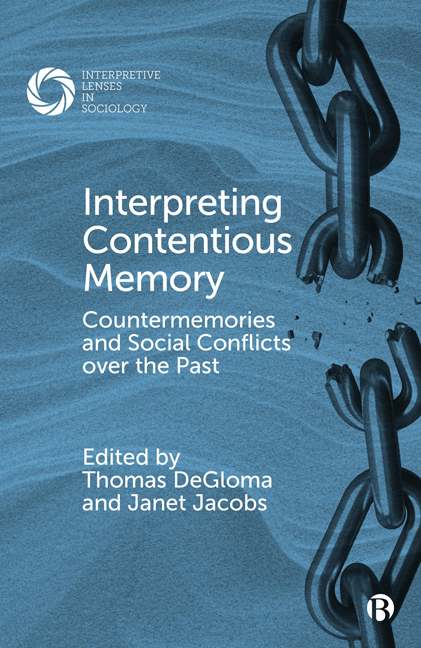Book contents
- Frontmatter
- Contents
- Series Editors’ Preface: Interpretive Lenses in Sociology – On the Multidimensional Foundations of Meaning in Social Life
- Notes on Contributors
- Acknowledgments
- 1 Introduction: Interpreting Contentious Memories and Conflicts over the Past
- PART I Interpreting Memories in the Social Dynamics of Contention
- PART II Racism, Exclusion, and Mnemonic Conflict
- PART III Genocide, Memory, and the Historicizing of Trauma
- Index
8 - Contentious Pasts, Contentious Futures: Race, Memory, and Politics in Montgomery’s Legacy Museum
Published online by Cambridge University Press: 20 January 2024
- Frontmatter
- Contents
- Series Editors’ Preface: Interpretive Lenses in Sociology – On the Multidimensional Foundations of Meaning in Social Life
- Notes on Contributors
- Acknowledgments
- 1 Introduction: Interpreting Contentious Memories and Conflicts over the Past
- PART I Interpreting Memories in the Social Dynamics of Contention
- PART II Racism, Exclusion, and Mnemonic Conflict
- PART III Genocide, Memory, and the Historicizing of Trauma
- Index
Summary
In Spring 2020 most of us were trapped in our homes in the eerie quiet of the pandemic shutdown when the excruciating video of George Floyd's murder began to circulate in a way that it may not have had people been out living their lives. Coming after the killing of Ahmaud Arbery in February and Breonna Taylor in March, the murder of Floyd captivated the nation and resulted in massive Black Lives Matter protests. The protests appear to be the largest in history with 15–26 million people participating in the US alone, though they also spread around the world (Buchanan, Quoctrung, and Patel, 2020). They garnered more media coverage than any protest in the last 50 years (Heaney, 2020) and spawned a social media torrent: between May 25 and June 5, race-and Black Lives Matter-related (BLM) videos were watched over 1.4 billion times on Twitter alone (Blake, 2020). Floyd's murder was horrific, but it was also the context in which it occurred that gave it such powerful traction. As sociologist Patricia Fernandez-Kelly (2020) wrote: “The pandemic made visible huge inequalities and fueled existential anxieties magnified by the sight of George Floyd's murder. The crime was a cruel reminder of the neglect with which people of color have been treated. It was also a call to action.”
As Fernandez-Kelly suggests, the protests in response to George Floyd's killing were not just about the present moment, but the centuries of racism and racial injustice that created the conditions in which it could occur, from slavery, through Jim Crow, to mass incarceration and current forms of racial terror, often at the hands of the state. The connection between this deeply entrenched racism of the past and its present manifestations is beginning to make its way into contemporary mainstream debates and protests about race in the US, and is part of a larger struggle playing out around the world over the contentious past of colonization, slavery, and their lasting legacies of violence, inequality, and injustice. One space in which these struggles play out is the memorial museum, which encompasses both the educative functions of history museums and the affect of social memory.
Information
- Type
- Chapter
- Information
- Interpreting Contentious MemoryCountermemories and Social Conflicts over the Past, pp. 154 - 174Publisher: Bristol University PressPrint publication year: 2023
